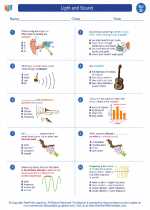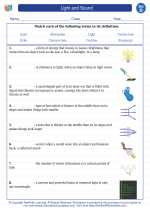Light and Sound -> cooperation
Cooperation in Science
Cooperation is a vital concept in science that refers to working together for the common good. It is seen in various natural systems, from cells in a multicellular organism to animals in an ecosystem. Cooperation plays a significant role in maintaining the balance of nature and the survival of species.
Types of Cooperation in Science
- Symbiosis: This is a long-term interaction between two different species where both benefit. Examples include the relationship between bees and flowers, and the mutualistic relationship between fungi and plant roots.
- Cellular Cooperation: Within multicellular organisms, different types of cells cooperate to perform specific functions. For example, muscle cells work together to facilitate movement, and nerve cells communicate to transmit signals.
- Social Cooperation: Many animal species, such as ants, bees, and wolves, exhibit social cooperation. They work together to build nests, forage for food, and protect their community.
Benefits of Cooperation
Cooperation offers several benefits in scientific contexts:
- Efficiency: Working together allows for the division of labor, leading to more efficient outcomes.
- Survival: In ecosystems, cooperation can increase the chances of survival for the species involved.
- Adaptation: Cooperative behavior can aid in adapting to changing environmental conditions.
Study Guide for Cooperation in Science
To better understand cooperation in science, it is important to:
- Explore examples of cooperation in different ecosystems and discuss the benefits they provide.
- Investigate the role of cooperation in the functioning of multicellular organisms and how different cells work together.
- Research the impact of social cooperation in animal communities, including strategies for communication and division of labor.
- Discuss the evolutionary advantages of cooperation and how it contributes to the success of species.
By studying cooperation in science, we gain valuable insights into the interconnectedness of natural systems and the importance of collaboration for the sustainability of life on Earth.
[Cooperation] Related Worksheets and Study Guides:
.◂Science Worksheets and Study Guides Fourth Grade. Light and Sound
Study Guide Light and sound
Light and sound  Worksheet/Answer key
Worksheet/Answer key Light and sound
Light and sound  Worksheet/Answer key
Worksheet/Answer key Light and sound
Light and sound  Worksheet/Answer key
Worksheet/Answer key Light and sound
Light and sound  Vocabulary/Answer key
Vocabulary/Answer key Light and sound
Light and sound  Vocabulary/Answer key
Vocabulary/Answer key Light and sound
Light and sound  Vocabulary/Answer key
Vocabulary/Answer key Light and sound
Light and sound 

 Worksheet/Answer key
Worksheet/Answer key
 Worksheet/Answer key
Worksheet/Answer key
 Worksheet/Answer key
Worksheet/Answer key
 Vocabulary/Answer key
Vocabulary/Answer key
 Vocabulary/Answer key
Vocabulary/Answer key
 Vocabulary/Answer key
Vocabulary/Answer key

The resources above cover the following skills:
PHYSICAL SCIENCE (NGSS)
Waves and their Applications in Technologies for Information Transfer
Students who demonstrate understanding can:
Develop a model of waves to describe patterns in terms of amplitude and wavelength and that waves can cause objects to move.